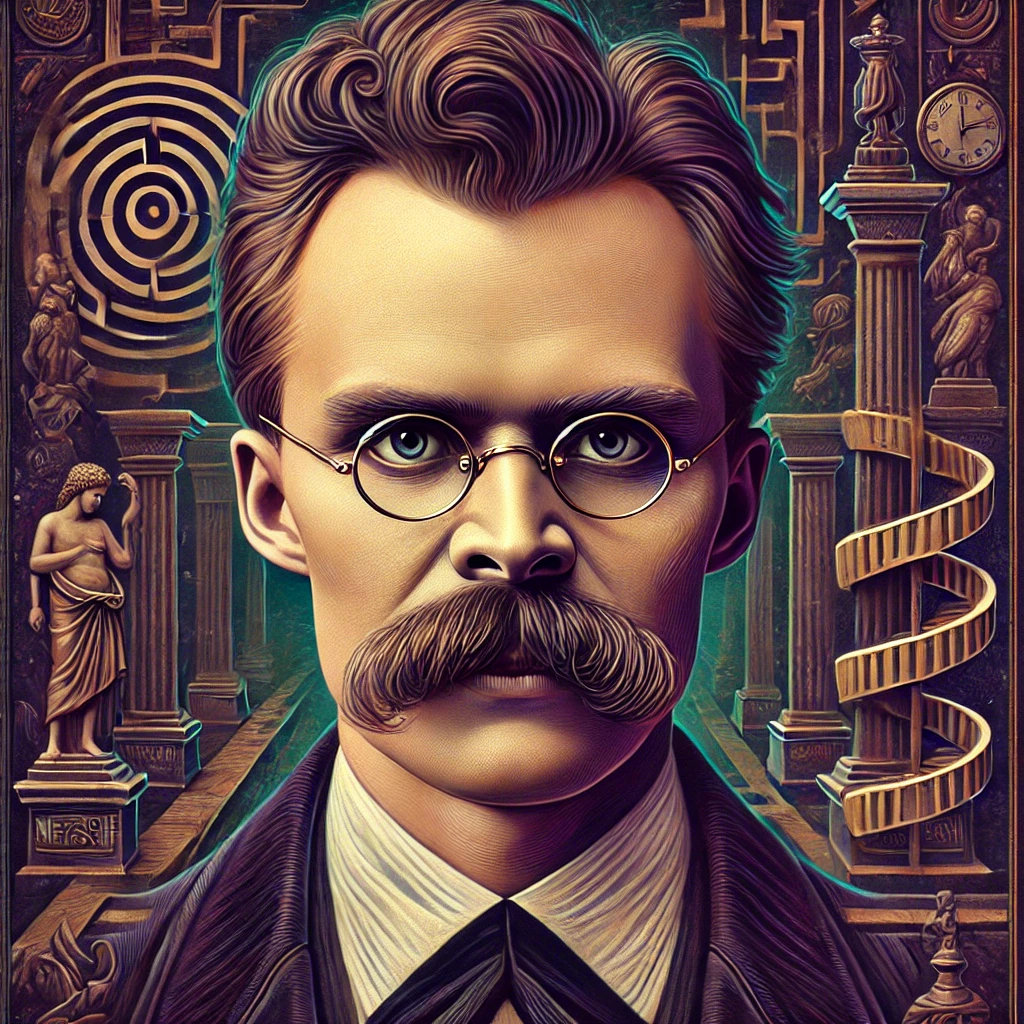Nihilism

Place of Origin: Europe (primarily Russia and Germany)
Century of Origin: 19th Century CE
Associated Philosophers:
Overview of Nihilism
Nihilism is a philosophy that suggests life has no built-in meaning or purpose. It questions whether things like truth, morality, or values really exist in any universal sense. Nihilists believe that, because there’s no ultimate plan or higher purpose in the universe, people must create their own meaning. But they also accept that this meaning is temporary and personal, not something everyone has to agree on. Nihilism can feel freeing to some because it rejects the idea that we need to follow preset rules, but it can also feel challenging because it means we have to decide what's meaningful for ourselves.
In terms of metaphysics, which looks at the nature of reality, Nihilism says that there’s no higher reality or deeper purpose beyond the world we see. Nihilists argue that there’s no grand design or meaning behind the universe—things just exist without any special reason. They don’t believe in things like destiny, fate, or a bigger plan. For Nihilists, searching for a deeper meaning in life is pointless because they believe there isn’t one.
In terms of knowledge, Nihilism challenges the idea of universal truths. Nihilists believe that all knowledge is subjective, meaning it’s based on personal experiences and perspectives. They argue that there’s no single 'truth' that applies to everyone. What one person thinks is true might be totally different for someone else, and Nihilism accepts that as part of the human experience.
When it comes to ethics, Nihilists don’t believe in objective right or wrong. They think that moral values are human creations, not something built into the universe. For a Nihilist, good and bad are just ideas people made up, and they can be different for different people. This doesn’t mean that Nihilists think people should be bad—it just means they don’t believe in following moral rules just because they exist. Each person decides what’s right for them, but they know that their values don’t have to apply to everyone else.
Nihilists use logic to question the foundations of other belief systems. They ask things like, 'Why do we think this is true?' or 'What makes us believe this is right?' By challenging the reasons behind common beliefs, Nihilists aim to show that many things people take for granted, like moral rules or life's meaning, aren’t based on solid foundations. Nihilism pushes people to think critically and question everything.
In terms of art and beauty, Nihilists believe that beauty is subjective, meaning it depends on individual taste. They argue that there’s no objective way to say what is beautiful or what isn’t. Art, like everything else, doesn’t have any inherent meaning unless we give it one. For a Nihilist, what matters is how a person experiences art, not whether it follows traditional ideas of beauty.
The method used in Nihilism is to question everything and challenge traditional beliefs. Nihilists don’t accept ideas just because they’ve been around for a long time or because other people believe them. They ask tough questions about whether things like morality, truth, or meaning really exist, and they often conclude that these ideas are human-made and not universally true.
Nihilism views humans as beings who exist without any inherent purpose. Unlike other philosophies that might say people have a higher calling or destiny, Nihilism says that we are just part of the world without any special role. It emphasizes that each person must create their own meaning in life, rather than looking for a meaning that already exists.
Nihilists don’t believe in any fixed political or social systems. They argue that all systems, like democracy or communism, are human-made and not inherently right or wrong. Nihilism doesn’t support any specific political beliefs because it questions whether any system can be based on absolute truths. Nihilists believe that people should be free to challenge and change political systems if they don’t serve individuals’ needs.
Nihilism became popular in the 19th century, especially through the works of philosophers like Friedrich Nietzsche. He wrote about how traditional values, like religion and morality, were losing their power in society. In modern times, Nihilism has influenced many thinkers, artists, and writers who question whether there’s any ultimate purpose or meaning in life.
Key themes in Nihilism include questioning the meaning of life, doubting traditional morals and values, and accepting that the universe doesn’t have a higher purpose. Nihilists challenge the idea that anything in life is predetermined and believe that each person must create their own purpose.
Friedrich Nietzsche is one of the most well-known philosophers associated with Nihilism. He wrote about how society was losing its belief in absolute truths and how people would need to create their own values. Other thinkers, like Jean-Paul Sartre, also explored ideas related to Nihilism, especially the idea that people must find their own meaning in a world without inherent purpose.




